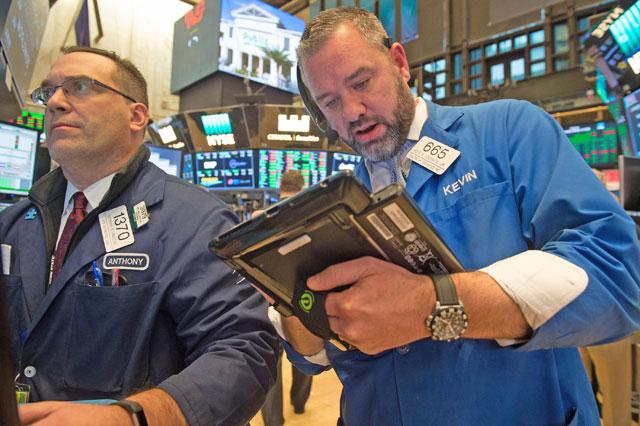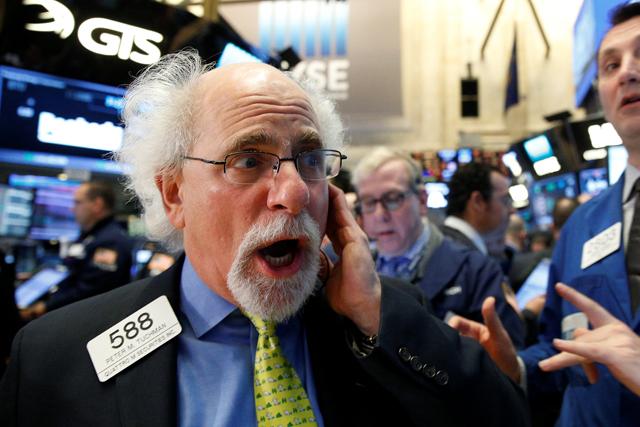You are here
Shares sink towards 1-year low as bears bite again
By Reuters - Oct 23,2018 - Last updated at Oct 23,2018

A man walks past a stocks display board that shows a drop in the Hang Seng Index of 3.08 per cent, or 806.60 points, closing at 25,346.55, in Hong Kong on Tuesday (AFP photo)
LONDON — An ugly start to European trading pushed world shares towards their lowest level in a year on Tuesday, as negative drivers from Saudi Arabia's diplomatic isolation to worries about Italy's finances and trade wars piled on the pressure.
Selling escalated from Wall Street into a heavy selloff in Asia before hitting Europe, which was facing a fifth day of uninterrupted declines.
The tech sector posted the worst performance after chipmaker AMS plunged 17 per cent as its outlook triggered alarm bells, but there was a broader force at play.
The pan-European STOXX 600 was near a two-year low with almost half of its stocks now in bear-market territory — down 20 per cent from their peak.
Germany's DAX also fell to late 2016 lows, London's FTSE was down near April lows, and MSCI's world share index was just two points of a one-year low.
"This morning weaker stocks in Asia raised some eyebrows and overall sentiment is suffering from trade tensions, Italy to Brexit; a concoction of concerns," said ING strategist Benjamin Schroeder.
The euro also fell towards a two-month low and Italian bonds struggled before a European Commission meeting that could see Brussels take the unprecedented step of demanding changes to Italy's recently laid out budget plans.
That has bred some doubt about the European Central Bank (ECB) raising interest rates next summer, leaving the euro at $1.4390. Doubts about Britain's prime minister, mired in a stalemate over Brexit, kept the pressure on sterling.
All that contributed to the risk-averse mood, with the safe-haven Japanese yen and Swiss franc strengthening while higher-yielding currencies like the Australian and New Zealand dollars fell.
"The prospect of a normalisation of [ECB] monetary policy was the main reason why the euro was able to appreciate over the past year. However, there is a rising risk that this support is now going to crumble," Commerzbank analyst Thu Lan Nguyen said.
Saudi tensions
Markets were also waiting for Turkey's president to reveal his country's take on the killing of Saudi Arabian journalist Jamal Khashoggi at a Saudi consulate in Istanbul this month.
Saudi Arabia, a top crude oil exporter, faces international pressure to provide all the facts about an incident that has raised a global storm and added the threat of sanctions against the kingdom to a list of market concerns.
US President Donald Trump said on Monday he was not satisfied with what he had heard from Saudi Arabia about the killing, but expressed reluctance to punish the kingdom economically.
Investors worry that may lead to Saudi retaliation through crude oil, although a Saudi pledge to play a "responsible role" and keep markets supplied held down crude prices on Tuesday.
Front-month Brent crude oil futures were at $79.51 a barrel, down 0.4 per cent. US West Texas Intermediate (WTI) crude futures were at $69.12 a barrel, dropping 0.35 per cent.
Asia's overnight tumble gave back some of the ground the region had clawed back over the last two sessions.
MSCI's broadest index of Asian shares dropped 2 per cent to a 1.5 year low, with declines in many of the region's heavyweight bourses even more pronounced.
South Korea's Kospi and Hong Kong's Hang Seng both fell 3 per cent and Japan's Nikkei lost 2.7 per cent.
"We've got a few negative factors when market sentiment was already fragile," said Hiroyuki Ueno, senior strategist at Sumitomo Mitsui Trust Asset Management. "And earnings from some Japanese companies were weaker than expected, with some starting to blame trade wars."
The yen gained 0.4 per cent amid the risk-off mood to 112.42 to the dollar.
The yuan was little changed, but stood near Monday's 21-month low of 6.9445 per dollar in the onshore trade on expectations China will pursue looser monetary policy to cope with pressure from US President Donald Trump on tariffs.
Related Articles
NEW YORK — Broad gains in the US equity market turned global stocks higher on Tuesday after President Donald Trump said a "great deal" could
NEW YORK — The US dollar fell to a more than three-year low against the euro on Friday, extending recent losses on expectations European Cen
LONDON — European shares edged lower on Tuesday, after falls on Asian bourses, and low-risk government debt yields fell as political risks f














